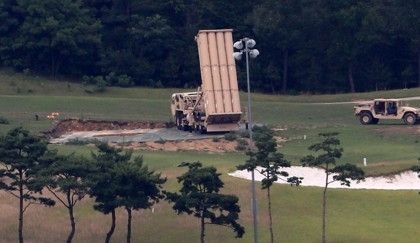
The defense ministry said it will decide whether to fully deploy the U.S. weapon on its soil after the "general" or "ordinary" environmental survey to be held in accordance with a domestic law., source from the Yonhap.
The allies will soon begin consultations on details, including the size of an area subject to the measure under the decision by an inter-agency task force on the issue, a ministry official said.
"It's hard to talk about an exact timeline, as it depends on consultations with the U.S. side and other elements," he told reporters on background. "Usually, it takes 10 to 15 months to complete such a process."
But the period could be shortened since a survey is currently being conducted, he added, reaffirming the government's commitment to wrapping up the process as early as possible.
South Korea agreed to provide the U.S. Forces Korea (USFK) with 700,000 square meters of land at a former golf course in Seongju, some 300 kilometers southeast of Seoul, to house a THAAD battery.
Another ministry official stressed that the new environmental step does not mean a reversal of the "alliance decision" itself, saying it's aimed at enhancing the "procedural justification" at home.
A "small-sized" environmental survey has been under way there since December last year in a decision by the country's former Park Geun-hye administration.
Two THAAD interceptor launchers are already operational at the site, along with a powerful X-band radar, and a fire control and communication system. Four other launchers remain stored at a nearby USFK base.
The ministry characterized it as a "temporary" operation. It said it would allow the fuel supply and some construction works for troops there, while consulting with the environmental ministry on the evaluation that has been done so far.
The left-leaning Moon Jae-in administration, launched in May, took issue with the legitimacy and transparency of the THAAD deployment.
Presidential aides believe the allies should have conducted a preliminary environmental survey before starting the installation of relevant equipment.
They also suspect that the former government scaled down environmental survey without appropriate procedures in a bid to dodge strict environmental assessment regulations and facilitate the deployment.
South Koreans are split over THAAD amid fierce backlash from China. Some, mainly conservatives, say it's a must to help defend the country and the USFK against North Korea's missile threats. Others pointed out, however, the government should adequately collect public opinions on such a matter related to national security.
























